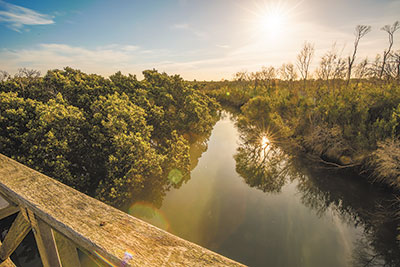Mornington Peninsula Shire, Victoria, is celebrating its unique wetland areas under the World Wetlands Day 2019 international theme of ‘wetlands and climate change’.
World Wetlands Day is celebrated internationally each year on 2 February marking the anniversary of the signing of the Convention on Wetlands of International Importance (Ramsar Convention) in Ramsar, Iran, on 2 February 1971.
The Ramsar Convention’s broad aims are to halt the worldwide loss of wetlands and to conserve, through wise use and management, those that remain.
Mayor David Gill said the Mornington Peninsula had two of Australia’s most significant wetlands.
“The Western Port Ramsar wetlands near Hastings is part of the United Nations (UNESCO) declared special biosphere reserve of the Western Port catchment and one of only nine biospheres in Australia.
“The Tootgarook wetlands provide habitat for a range of plants and animals, help reduce the impacts of flooding, maintain good water quality in rivers and recharge groundwater.
“Both these wetlands also play an important role in our approach to climate change mitigation and adaptation, through capturing and storing carbon to reduce atmospheric greenhouse gases, and providing resilience to hazards such as flooding, storm surge and sea level rise – yet these important and fragile ecosystems are susceptible to climate change and insensitive development.
“It’s up to all of us to work together as a community to proactively address climate change in our own backyard to secure these wetland areas for future generations.”
Last year Council took action to protect Tootgarook Wetland by acquiring an adjoining seventy-acre parcel of land forming part of the largest groundwater-dependent ecosystem and freshwater marsh in the region.
The 590 hectare wetland area holds significant environmental and cultural value and is home to more than 240 indigenous plant species and a variety of fauna, including internationally significant birdlife.
Council recently adopted a new Climate Change Community Engagement Strategy designed to help the community reduce greenhouse gas emissions and be better prepared for the impacts of climate change.
As part of the Strategy, the Shire has committed to assist the community to achieve a minimum community greenhouse gas emission reduction of 2.9 percent annually.

















